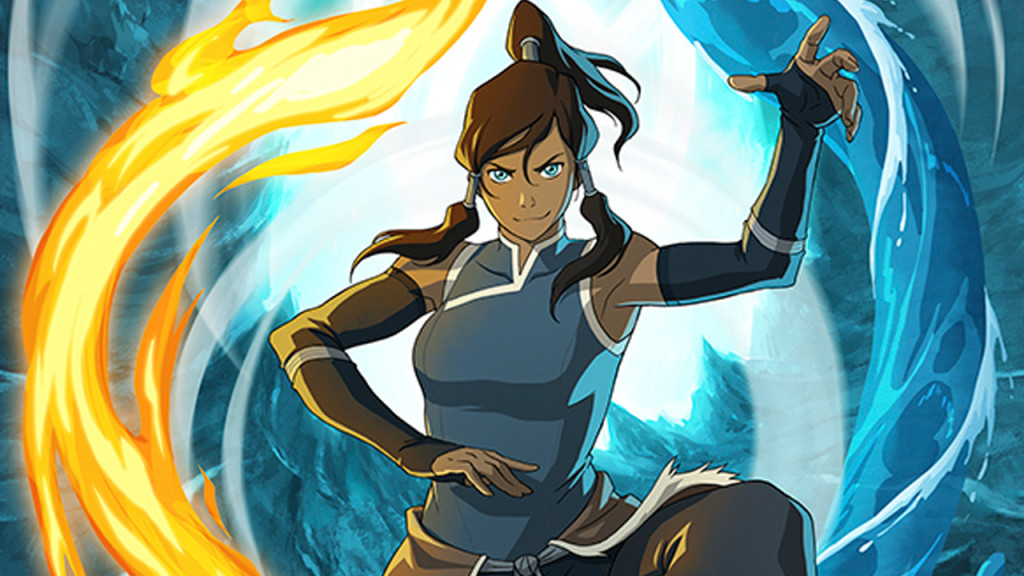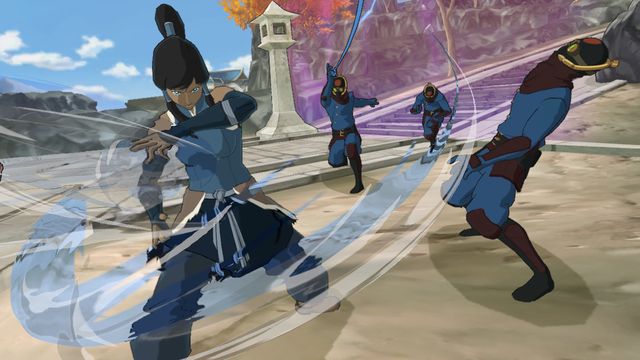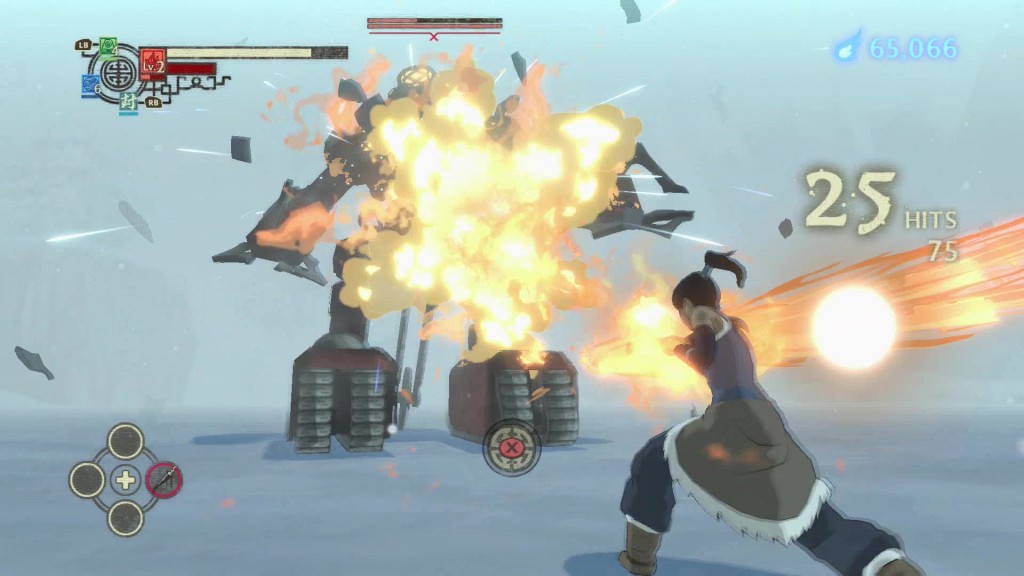 The Legend of Korra is a difficult game to review. On the one hand, Platinum Games headed the project (with some help from Activision, I suspect), and that name brings with it certain expectations. Namely, one would hope to find a fully-formed combat system with interesting enemy types and level designs, along with a progression system to match. The Legend of Korra does perform these tasks, but these seem pretty rote for Platinum Games at this point, and expected.
The Legend of Korra is a difficult game to review. On the one hand, Platinum Games headed the project (with some help from Activision, I suspect), and that name brings with it certain expectations. Namely, one would hope to find a fully-formed combat system with interesting enemy types and level designs, along with a progression system to match. The Legend of Korra does perform these tasks, but these seem pretty rote for Platinum Games at this point, and expected.
On the other hand, anyone who’s played other games in this genre will find out very quickly that The Legend of Korra sits at a halfway house of possible target markets. Really, this is a licensed game for Nickolodeon’s Avatar universe (the second series, I think?), and thus it contains tons and tons of fanservice for those sorts of people. For anyone who’s never watched any piece of media in, around, or even near Avatar other than a terrible M. Night Shyamalan film, you’ll be completely, and utterly, lost. The plot doesn’t even bother to bring you up to speed at all, instead throwing you into an already-existent media property with zero introduction. That’s not exactly the way to introduce a new person (i.e., ME) to this franchise, and it certainly didn’t bode well. It’s a bit like being Moses running away from Egypt: you’re a stranger in a strange land.
16 Now the priest of Midian had seven daughters; and they came to draw water and filled the troughs to water their father’s flock. 17 Then the shepherds came and drove them away, but Moses stood up and helped them and watered their flock. 18 When they came to Reuel their father, he said, “Why have you come back so soon today?” 19 So they said, “An Egyptian delivered us from the hand of the shepherds, and what is more, he even drew the water for us and watered the flock.” 20 He said to his daughters, “Where is he then? Why is it that you have left the man behind? Invite him [u]to have something to eat.” 21 Moses was willing to dwell with the man, and he gave his daughter Zipporah to Moses. 22 Then she gave birth to a son, and he named him [v]Gershom, for he said, “I have been a [w]sojourner in a foreign land.”
Exodus 2
Unfortunately, The Legend of Korra isn’t too kind like the Midianites! I’m not sure who, exactly this game is for. Is it for Korra fans? Yeah, sure it is, I guess? I don’t know much about the plot, other than arbitrary removal of bending abilities so that Metroid stuff happens for game-related reasons. You run around a city, Korra talks about things you don’t know about if you’re me, and then you stomp some dudes into the ground with some visceral combat. But, if you’re playing on Normal, the game presents quite a stiff challenge that might throw off Korra fans entirely, appealing to the video game fans instead. And they, of course, won’t be able to engage in the story, or the dumb and unnecessary endless runner stuff (the less said about that, the better).
 But hey, there’s a fun combat system here! Korra tends to take an “all-range” approach to combat situation, a bit different from the norm. Enemies with both close-ranged and ranged attacks will attack you simultaneously, but Korra has the tools to deal with it. Each Bending style (Water, Earth, Fire, Wind) has its own individual use in combat situations. Water gives Korra projectile attack strings, while Earth contains her most powerful physical attacks. Fire becomes your “super fast attack combo” weapon, and Wind excels at indiscriminate area-of-effect clearing. Each one of them can also be charged by holding down the light or heavy attack button (it’s called Chi or something), which increases both the range and damage of your attacks in that style. Not surprisingly, charging makes you more effective at nearly everything, so finding spots to charge while you’re trying not to die becomes a challenge.
But hey, there’s a fun combat system here! Korra tends to take an “all-range” approach to combat situation, a bit different from the norm. Enemies with both close-ranged and ranged attacks will attack you simultaneously, but Korra has the tools to deal with it. Each Bending style (Water, Earth, Fire, Wind) has its own individual use in combat situations. Water gives Korra projectile attack strings, while Earth contains her most powerful physical attacks. Fire becomes your “super fast attack combo” weapon, and Wind excels at indiscriminate area-of-effect clearing. Each one of them can also be charged by holding down the light or heavy attack button (it’s called Chi or something), which increases both the range and damage of your attacks in that style. Not surprisingly, charging makes you more effective at nearly everything, so finding spots to charge while you’re trying not to die becomes a challenge.
Like other Platinum Games, you also retain an invincible dodge (limited to four in a row, just like Bayonetta) and a dedicated block/counter button. The counter seems a bit overpowered to me, if you can get the (generous) timing down, as nearly every attack from anything, including bosses can be countered. Countered at the right time gives you a INCREDIBLY powerful attack, and that meant learning counter timings became the most important skill for most humanoid enemies. And, to add to the overpowered nature of the counter, the button also blocks, so if you’re off on your timing a little bit, you can block most attacks. Thankfully, most elemental attacks can only be dodged, but that just means you prioritize ranged enemies first before getting to work countering other Benders and giant robots.

Unfortunately, the enemy and level designs seem pretty uninspired. I’d say there’s a total of five or six enemies at best, and once you learn how to deal with them, they usually just stack them on top of each other in greater numbers. That becomes a problem due to the lock-on system, which I honestly could not figure out. I’d zoom in on a single enemy, and find myself unable to change my lock-on target far too frequently. The camera doesn’t much cooperate even when you don’t use the lock-on, although I found facing the camera away from enemies made them stop attacking – not surprisingly, I abused the heck out of these to avoid dying a lot.
And die a lot I did, for whatever reason. The game’s pretty unforgiving, weirdly enough, and I died plenty of times due to the aforementioned camera issues. Still, once I learned how to counter (and also, using the healthy recovery accessory which continually gives you more life, which is ALSO TOO POWERFUL NOT KIDDING), it became a bit too easy. Like, what were the design decisions going on here? Make sure Korra fans can finish it? Make sure Platinum fans are challenged? With such cross purposes, nobody really wins.
Simply put: I don’t get this game, but I wanted to enjoy it. For $14.99 and a six month development cycle, it shows. The Legend of Korra will certainly please some strange Venn diagram of potential customers, but I’m not in it. For my part, I’d just rather play almost any of Platinum’s other titles, licensed or not. The resources given to the developer, unfortunately, hamper the final product significantly, and that’s a shame.
